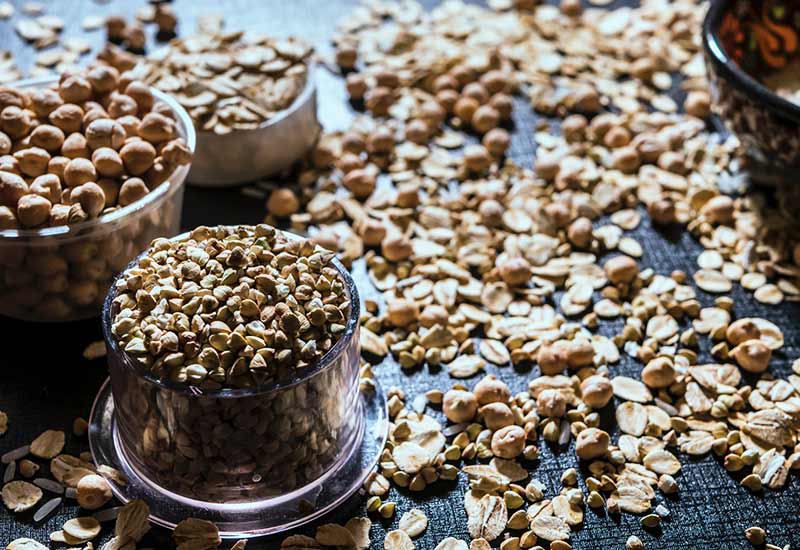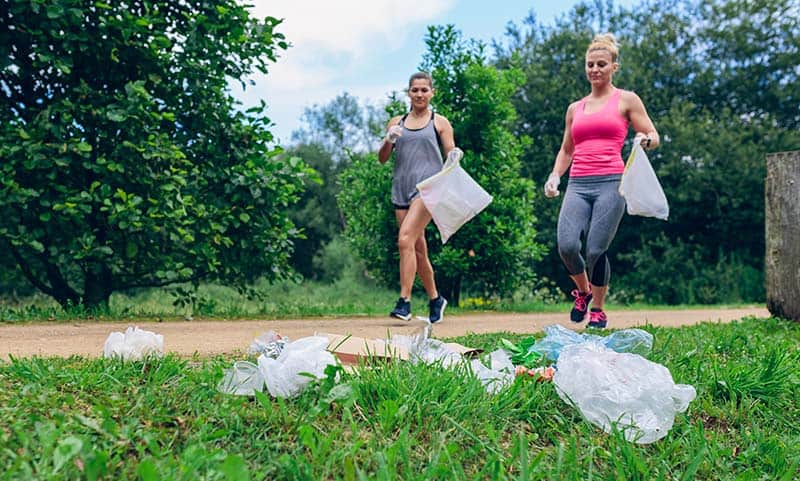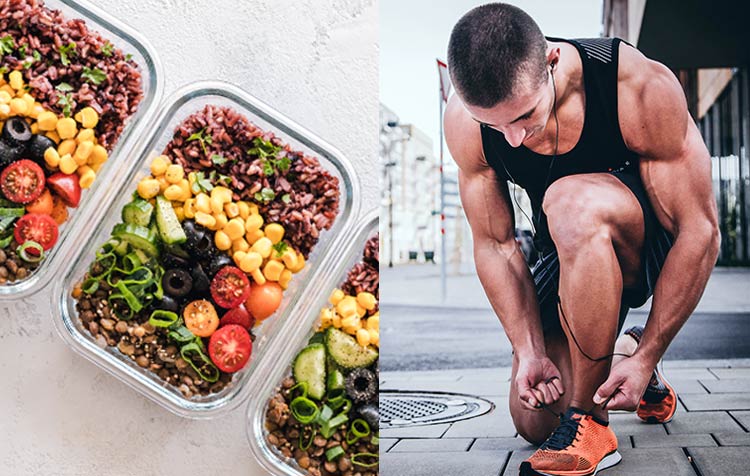Want to learn more about the connection between veganism and fitness? Then you've come to the right place! I've always been a real sports freak - from high-protein diets to performance-enhancing apparel - from soccer to bodyweight training. But when I went vegan, primarily for ethical reasons, I first had to take a closer look at how animal products or animals themselves played a role in the activities surrounding my physical fitness.
In this article I would like to give you my most important insights on plant-based sports nutrition, vegan sportswear and last but not least, animal-friendly sports. In addition, I would like to answer an essential question for you: Is it possible to do vegan sports? Let's go!
Here you can find a short overview of the content of the article:
Why actually Vegan Fitness?
The question could also be, "What does sport have to do with animals?" or "What are the motivations for the vegan lifestyle?" - the answers are quite far-reaching, but I will try to summarize them here as compactly as possible.
Those who enjoy sports could thereby Clothing wear that is partly made of animal materials, such as leather, wool or silk. I honestly never paid attention to the origin of the material when buying my sports clothes until I went vegan. Similarly, it was with the Food. Meat, shakes from milk and protein powder, eggs & Co. are supposed to increase athletic performance after all, so I consumed them. And then there are yes some Sports, under the exercise of which animals must suffer.
But why change anything about it? For example from moral reasons. Simply because Animals sentient beings are and should not be exploited, tortured or killed for our benefit. But of course also for ecological motives. Because the Factory farming, for example, to produce animal foods, is a major contributor to the heating of the planet and to the Earth Overload Day every year comes a little closer to the beginning of the year.
But even if these aren't convincing reasons for you to pursue vegan fitness, you should at least do it for the sake of your health. health reasons do You balanced vegan diet is healthy. A comprehensive American Dietetic Association study For example, has underscored that plant-based diets reduce the risk of Heart disease, type 2 diabetes, hypertension or Overweight, significantly reduced.
Does plant-based nutrition promote athletic performance?

Justice, environmental protection, health and a better life together - now we know why veganism is one of the fastest growing global movements. But can a plant-based diet be reconciled with long-term fitness goals and sustained athletic performance? The answer is yes. However, since the reasoning is very extensive, I would like to divide it a bit by answering the most common questions around the topic.
Which nutrients do vegan athletes have to pay special attention to?
As part of a healthy and balanced sports diet, vegans (as well as mixed dieters) must pay attention to the intake of essential macro- and micronutrients.
Macronutrients
Macronutrients are the basic building blocks of any food that provide energy to our body. The "macros" are essential for a healthy, optimally functioning organism. They include Carbohydrates, proteins and fats. The fact that plant foods are particularly rich in micronutrients is considered one of the most important health benefits of the plant-based diet. This is another reason why vegan non-athletes and also athletes can cover their macronutrient requirements relatively easily. However, as energy burn increases, more energy should be consumed accordingly.
Important: Omega-3 fatty acids are among the potentially critical nutrients in a plant-based diet. The alpha-linolenic acid (ALA) can be easily supplied through foods such as walnuts, chia and flax seeds. But our bodies can only convert small amounts of ALA to eicosapentaenoic acid (EPA) and docosahexaenoic acid (DHA). Therefore, omega-3 supplementation is recommended.
Micronutrients
Our body needs micronutrients in much smaller quantities - but since it cannot produce them itself, their intake through food is essential. The "micros" include above all Vitamins, minerals and proteinogenic amino acids.
As an athlete, the main thing you should look for in your plant-based sports diet is adequate intake of Iron, Zinc, Calcium and Iodine, as well as Vitamin B12 pay attention. Since the Vitamin B12 not naturally present in vegan foods it is the most critical nutrient of the plant-based diet. As a vegan, you must therefore supplement it.
Is muscle building possible with vegetable proteins?
Many people fear a protein deficiencyas soon as they ban meat, fish, eggs and any dairy products from their meals. Therefore, two essential questions: Is it possible to meet the daily need for proteins via vegan meals - and if so, is muscle building with plant-based protein sources also useful? The answer is yes in both cases.
Daily requirement
For athletes and sportsmen recommend the National Institutes of Health a higher, daily protein intakethan for the average consumer. However, this can also be covered with protein-rich plants, such as legumes, oatmeal, whole grain products or tofu.₁
Muscle building
A higher intake of protein promotes muscle growth, regardless of whether it is animal or plant protein.₂ However, the protein from animal meat has a higher, biological valuethan many plant-based protein sources, which is why you should combine several of the latter.
Also the Amino acid distribution is often less favorable with plant-based protein sources - but with the help of the combination of many protein-rich vegan foods, the amino acid profile can also be optimized.
Countless athletes, such as Strongman Patrik Baboumian or Bodybuilding World Champion Alexander Dargatz are living proof that muscle building and muscle maintenance can be achieved not only with a mixed-food and vegetarian, but Also compatible with a vegan lifestyle are.
And what about protein powder? By the way, this is also available in many different variants and flavors purely vegetable.
Which plant foods are rich in protein?
So often I hear that yes, I'm missing protein if I don't eat meat anymore. If you also like this one from many annoying phrases that vegans often have to listen to, you can simply send your counterpart the following list of plant-based, protein-rich foods:
- Nuts
- Seeds
- Lenses
- Beans
- Oatmeal
- Buckwheat
- Chickpeas
- Amaranth
- Broccoli
- Tempeh
- Peas
- Tofu
- Quinoa
- …
The list could go on and on. There really are countless, vegan protein sources, which will help you with your plant-based sports nutrition.
Which famous athletes live vegan?
More and more well-known athletes from a wide range of disciplines are eating a purely plant-based diet. They are Living evidence for the fact that the animal-friendly form of nutrition does not diminish their performance, but promotes. Below I have compiled some of them for you clearly:
- Patrik Baboumian (Strongman, strength athlete)
- Venus Williams (seven-time Grand Slam winner in tennis)
- Alexander Dargatz (Bodybuilding World Champion)
- Nate Diaz (Welterweight MMA fighter)
- Lewis Hamilton (seven-time Formula 1 world champion)
- Yannick Gerhardt (Football player of VfL Wolfsburg)
- Scott Jurek (ultramarathon runner)
- Tiarah Lue Blanco (Gold medal winner in surfing)
- Colin Kaepernick (Quarterback, American football player)
- Novak Đoković (Number 1 in the world tennis rankings)
- …
Notice: Also this series could be continued basically infinitely, since there are now so many, vegan celebrities (besides athletes, especially actors and singers). In the linked article you can find the corresponding list.
What plant-based meals are suitable for fitness training?
Chips and cola are also vegan - and anything but suitable for fitness training. That's why I'd like to give you some directly applicable inspiration for performance-enhancing recipe ideas in the context of your vegan fitness.
Breakfast
- Oatmeal with caramelized banana
- Smoothie Bowl (e.g. with blueberries, oatmeal and pumpkin seeds)
- Kiwi Blackberry Chia Pudding
- Soy yogurt (e.g. with blueberries and grapes)
- Apple Quinoa Bowl (e.g. with cinnamon)
Hot meals for lunch and dinner
- Tofu Pad Thai (Tofu, rice noodles and vegetables)
- Pasta Verde (e.g. wholemeal penne with tofu and broccoli)
- Lentil and spinach curry with coconut rice
- Chickpea omelet
- Sweet potato tempeh bowlRed lentil dhal
- …
Snacks for in between
- Vegan banana ice cream
- Edamame with chili oil
- Vegetable sticks with hummus (e.g. carrots, cucumber, zucchini or peppers)
- Mixed nuts
- Oatmeal pancakes
What plant-based fitness dishes propel you to peak performance? Feel free to write me your ideas and tips in the comments.
Is sports and fitness clothing always vegan?

Whether running shoes, boxing gloves, bustiers, leggings, soccer shoes, outdoor jackets or headbands - for truly vegan fitness equipment you have to look a little closer. Because time and again animal materials are hiding, such as. Leather, wool, silk, down, cashmere or Fur, in the garments.
Sometimes, however, animal ingredients cannot be identified either on the label or on the product itself. This is the case, for example, with the Adhesives, which, for example, may also consist of boiled hides or bones of animals.
Therefore, it makes sense to look directly at vegan fashion brands and suppliers of animal-free clothing. Vegan product seals, such as the following, provide you with a reliable indication. "Peta approved vegan" or the above all from food known "V-Label".
Which sports are vegan - and which are not or only partially?

One thing in advance: this is not about badmouthing or banning any particular sport. I just want to collect thoughts about which sports involve animals directly, indirectly or not at all.
Not vegan friendly:
- Fishing: When fishing, fish are killed or at least tortured when they are put back into the water after being caught.
- Equestrian: Horses are used as "sports equipment". Often they are driven to peak performance by force, so that injuries or collapses are pre-programmed.
- Racing Pigeons: The animals are sold off at auctions and sent on competition flights, which they only take on because they want to get home as quickly as possible. If the bred pigeons do not die already on the flight, they usually end up as city pigeons.₃
- Hunting: When hunting deer, foxes, badgers, partridges or wild boars, the primary goal is to kill an animal. It is the same with live pigeon shooting or hunting tourism or big game hunting for elephants, lions, giraffes and other wild animals.
- …
Notice: I don't want to upset anyone here, but one thing is undeniable - the animals would probably be better off if they were simply left alone.
Pretty vegan friendly:
- Running
- Plogging (Jogging and collecting garbage, see picture).
- Swimming
- Climbing
- Bicycle ride
- Sailing
- Surfing
- Weight training
- …
Most sports are usually vegan friendly, because they function entirely without animal involvement, or at least do not disturb wildlife in their daily lives.
This also includes many ball sports. Footballs, for example, are now rarely made from pig bladders, and tennis balls are increasingly made without wool. Motor sports are also basically compatible with the vegan way of life, as long as no animals are endangered on the race track and the noise pollution is kept within limits.
Can you think of any other vegan or more non-vegan sports? Then feel free to write me a comment and this article.
Doing vegan sports? No problem!
As you can see, you can not only stay fit with a plant-based diet, but also basically do sports in a way that animals can live in peace. From muscle building, to running shoes and training shirts, to the sport itself - everyone can also train their physical fitness without exploiting, torturing or hurting animals directly or in the background.
Since the vegan diet is very extensive, I advise you to make your Blood values at the Switching from a mixed diet to a "purely plant-based" diet Have regular medical checkups and always listen to your body's signals. That's what I did. Since then, I feel better - and I've also been able to improve my athletic performance.
Do you have questions, tips or suggestions on the topic of vegan fitness? Then I look forward to your comment under this post!
Be always kind to animals,

PS.: Under train sustainably you'll get lots of other tips that should help you with an environmentally conscious fitness program. Have fun!
References:
₁ American Dietetic Association, Dietitions of Canada (2003): Position of the American Dietetic Association and Dietitions of Canda: vegetarian diets. In: Journal of the Academy of Nutrition and Dietetics, 103 (6), S. 748-765. Online: https://jandonline.org/action/showPdf?pii=S0002-8223%2803%2900294-3. [04.02.2022].
₂ Mark Messina, Heidi Lynch, Jared M. Dickinson; et al. (2018): No Difference Between the Effects of Supplementing With Soy Protein Versus Animal Protein on Gains in Muscle Mass and Strength in Response to Resistance Exercise, available at https://journals.humankinetics.com/view/journals/ijsnem/28/6/article-p674.xml. [04.02.2022].
₃ Isabell Kuben: Brieftaubensport - ein grausames Hobby - kein Sport (Dec. 21, 2021), available at https://www.peta.de/themen/brieftaubensport. [04.02.2022].






